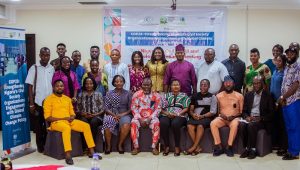Civil society organisations (CSOs) and stakeholders in the climate space play a fundamental role as the voice of the people advocating for justice and sustainability, grassroots connection and commitment to positive change for a collective effort to addressing climate change in Nigeria.

Ms. Titilope Akosa, Executive Director, Centre for 21st Century Issues, stated this on Friday, November 24, 2023, during an engagement with CSOs and other stakeholders in preparation for the 28th Session of the Conference of the Parties (COP28) to the United Nations Framework Convention on Climate Change (UNFCCC) holding in Dubai, the United Arab Emirates (UAE), November 30 to December 12, 2023.
During the CSOs pre-COP28 and Multi-stakeholder Meeting, she also highlighted the issue of funding as a bane militating against effective representation on the part of climate change experts especially in this part of the world.
In her submission, Dr. Iniobong Abiola-Awe of the Department of Climate Change, Federal Ministry of the Environment, who noted that the conference is a pivotal moment of collaboration to participate in the upcoming conference in Dubai, also said COP28 would enable Nigerian CSOs and stakeholders a privilege to forge solutions that will safeguard the climate as they present their challenges in unity.
“Engagement in the discussion is paramount to embark on the fight against climate-change. It is an opportunity to demonstrate the power of collaboration with the government and the community,” she maintained.
John Baaki, Deputy Executive Director, Women Environmental Programme (WEP), noted that all UN conferences and conventions create a platform, a structure, and a process through which non-governmental stakeholders can engage and add their voices to the processes.
He called on CSOs and multi-stakeholders participating at UNFCCC’s COP28 to play an active role in shaping the outcome of the negotiation by bringing the voices of the local communities and the vulnerable into the negotiations.
Baaki said: “The structure and processes of the UNFCCC are complicated, and it takes diligent study to understand it to better contribute to decisions at that level.
“Constituencies must also help to bridge the gap between the UNFCCC and the individual accredited organisations and so it is encouraged to join a constituency for more information and access to some decision-making structures at UNFCCC.
“It is also important, to learn about the issues that are on the agenda for discussion at this year’s COP and what the position of your country is on these issues. This will shape the strategies and alliances for better advocacy at COP28.”
Mr. Solomon Adefolu of the Nigerian Conservation Foundation (NCF) is of the opinion that CSOs must live up to their expectation of being the watchdog of the people they represent.
He said: “CSO must recognise themselves as the eyes, ears, and conscience of the world in the negotiation process and COP events and demand for national priorities, identify their countries’ negotiators and establish a communication medium aligned with a coalition or partnership on particular cause of interest, such as nature and justice.
“They should also make noise about their interest such as campaigns, social media, progress reporting, grant media interviews, follow and make input into the draft negotiation.”
Speaking on Media Engagement and Coordination at COP28, Michael Simire, Director, EnviroNews Development Network (Endenet), admonished all participating CSOs seeking to hold press conferences at the summit to make a formal application to the UN Climate Change Press Office at the event.
Simire, who noted that attendance at such sessions is limited to accredited media registered for the conference, said access is also granted to the UNFCCC communication team plus a limited number of staff from the delegation/organisation holding the press conference.
“Only registered government representatives and admitted observer organisations (admitted IGOs and admitted NGOs) may hold a press conference at COP28. However, there is no cost for use of the press conference room and each press conference is 30 minutes in length,” he added.
The event is part of the British High Commission (BHC) sponsored project – “COP28: Strengthening Nigeria’s Civil Society Organisations’ Engagement with Global Climate Change Policy” – aimed at improving the communication, lobbying and advocacy competencies of climate CSOs ahead of COP28, to ensure a more active participation at the global summit.
The project is being implemented by the Centre For 21st Century Issues (C21st), EnviroNews Development Network (Endenet) and Society for Planet and Prosperity (SPP).
By Ajibola Adedoye
